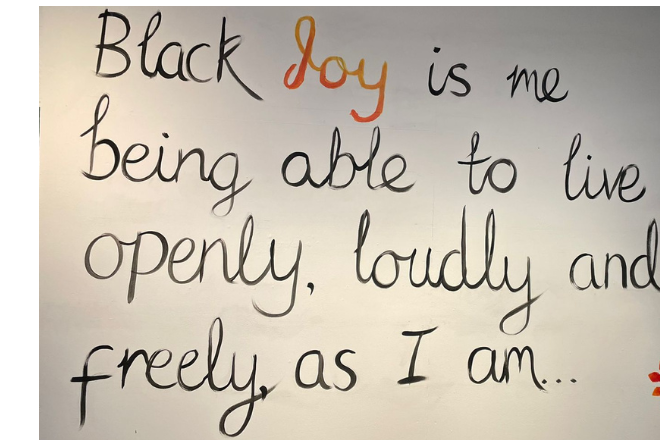This blog is written by Aleem who is one of the staff team at Co-Production Collective. He shares some of the things he has learnt from his work as co-ordinator for the Measuring Success in Co-production programme.
At Co-Production Collective we champion co-production for lasting change. We do this by living by our core values (of being kind, reflective, inclusive, embracing of change and transparent) that were co-produced by our community and applying them to everything we do. But what does this mean in the real world during the design and delivery of a co-produced project?
As part of the Measuring Success in Co-Production programme, eight different projects have been supported by our team of co-producers. We have met with them regularly over the last eight months and they are soon to complete their projects. By speaking to them in formal and informal meetings, we continue to learn about the best ways to support co-production.
Meeting project teams
At our Sharing and Learning event for this programme in April 2024, we met with all eight teams. Each of them is made up of people with lived or living experience, academics and other researchers, and people who are employed by the NHS, charities or other not-for-profit organisations. We asked the contributors to reflect on the challenges they had encountered when co-producing their projects and how they approached overcoming these challenges.
Co-production often brings people together from different walks of life, with the purpose of collaborating to achieve specific goals. For this to happen, people with different life experiences and different perspectives must learn to work together effectively. The importance of building and maintaining relationships is one of the principles of co-production that we adhere to at Co-Production Collective. This was identified (in a project that we were a part of in 2022 with UCL’s Institute for Global Prosperity, and Institute for Education, funded by UCL’s Grand Challenge of Justice & Equality, which you can read about in this blog) as one of the major challenges in working in a collaborative way. We were keen to learn more about how the projects we were funding in the Measuring Success Programme, approached this challenge.
A special cuppa event themed around trust
At the Sharing and Learning event in April, when reflecting on the way they built purposeful relationships within their project teams, the importance of trust emerged from our conversations. That’s why when we held a more informal cuppa style get-together in May 2024, we introduced this as a theme to explore in more detail.
Participants told us about creating inclusive spaces that encouraged diverse voices to be heard, how they did this, and the challenges they overcame as a result.
What are the practical ways in which trust can be built in co-produced projects?
Investing time to support each other was described as crucial to developing trust. This was especially true due to the sensitive nature of much of the work; whether this was in projects supporting families’ experiencing difficulties, or helping people who experience mental health problems, homelessness and substance misuse.
For some teams this meant that project ‘outputs’ were difficult to deliver within anticipated timelines. For others, taking the time to get to know each other had not slowed their projects down and had instead benefitted their work and led them in new directions:
“Out of that common ground, building connections … big ideas come out of small conversations”.
One team described how they would spend the start of their meetings talking about what they had been doing in their home lives, not related to work. This was reported as helpful to create a supportive environment and:
“A place to share”
A different contributor agreed with this, as they also told us that they started their meetings with informal chats about:
“Who we are, what we are interested in, what we did last week. Like a group counselling session”
Another contributor described this same process as:
“The honesty of people talking, instils trust and encourages participation and friendship”
Some of our teams had already worked together before, for example in a Lived Experience Advisory Group or on other projects previously. Yet others were brought together for the first time during their involvement in the Measuring Success programme:
“We started as 6 strangers: 4 people with lived experience of homelessness and 2 staff members”
Overcoming some of challenges of co-production
Getting people together could sometimes be difficult, whether online or in-person. This sometimes made it difficult to make shared decisions. One person described how they made provisional decisions with attendees that they checked again at later at team meetings where more of the team were present.
Everyone acknowledged that life circumstances sometimes led to people feeling the need to withdraw from projects, but generally it seems that most of the teams have remained consistent.
The size of project groups was raised as a consideration. In large groups, some suggested it was harder to get much done. By contrast, smaller groups were described as “boring”. Based on this discussion, we’d recommend working this out together while setting up and re-visit now and again throughout the project. Agree what size and approach works best to develop diverse and trusting relationships, and a plan to keep the project moving while allowing for shared decision making. Importantly, consider how your group defines small versus large, and what challenges these definitions may bring as you work together to find acceptable solutions.
The paid staff were seen to occupy a critical role in groups’ effectiveness, they provided consistency and ensured that everyone shared opportunities to contribute.
People are the most important part of co-production
The eight projects in the Measuring Success programme are due to send us their findings in August 2024. We have asked them to share their work in whatever way seems most appropriate for them. This may be making use of creative methods such as poems, a homemade publication involving words and graphics (zine), a podcast or even original pieces of music. Alternatively, they may choose to write a report .
Our team who are co-producing the programme, are also busy evaluating our own work and the programme as a whole, and we look forward to sharing what we have learnt with you soon.
I’ve really enjoyed working on this programme. I feel like I’ve learnt a lot working with our own team of 14 people, co-producing the programme since spring last year (2023). This has allowed us to develop our personal and work related relationships. Additionally, I feel that I’ve got to know many of the 45 different participants across the eight different projects, and again feel lucky to have learnt a great deal from them.
I’d like to leave you with two final quotes from lived experience contributors who are part of the Measuring Success programme, sharing some of the insights they have gained from being involved in this work:
“Co-production can produce positive change, compared with tokenistic engagement”
John (Closing the Loop Beyond the Loop: Strengthening Partnership Working in Mental Health with Meta-Co-Production)
“Co-production means different things and has shifted & evolved for me. It’s not just about output but connections”.
Derrick (Co-Production from the Inside Out).
More information about all eight of the projects can be found under the ‘Funded projects’ tab on the Measuring Success in Co-Production webpage.
Photo Credit: Photo by Ronda Dorsey on Unsplash





.png)

.png)
.png)


.png)
.png)
.png)